What Are Hives?
Hives, also known as urticaria, are a common skin reaction that appears as red, itchy welts or bumps on the skin. These welts can vary in size, from a few millimetres to several centimetres, and may change shape, move around, or disappear and reappear within hours.
Hives are caused by the release of histamine and other chemicals in response to triggers like allergens, infections, or stress. This reaction causes fluid to leak from small blood vessels under the skin, resulting in the characteristic swelling and itchiness.
Common Symptoms
- Welts Red, raised, and itchy bumps that often appear in clusters.
- Blanching The centre of a hive will turn white when pressed
- Itching Hives are typically very itchy, and the sensation can range from mild to severe
- Angioedema A more severe form of hives where swelling occurs in the deeper layers of the skin, most commonly around the eyes, lips, and genitals.
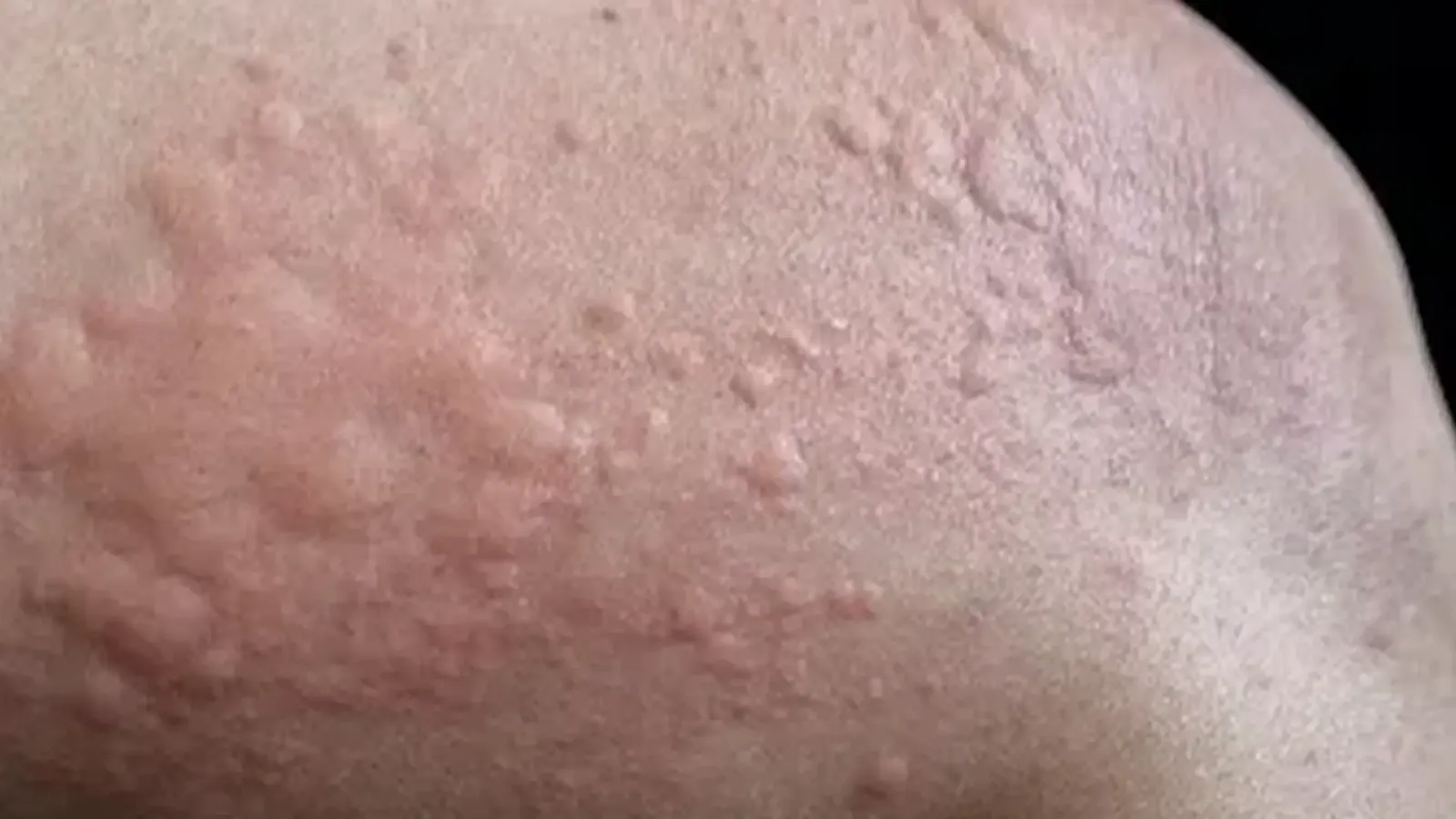
Types of Hives
Hives are typically classified into two main types based on how long they last:
- Acute hives Last less than 6 weeks and are often triggered by infections, allergens, or medications
- Chronic hives Persist or recur for more than 6 weeks and may not always have an identifiable cause
An expert diagnosis is important to determine the type, underlying trigger, and best course of treatment.
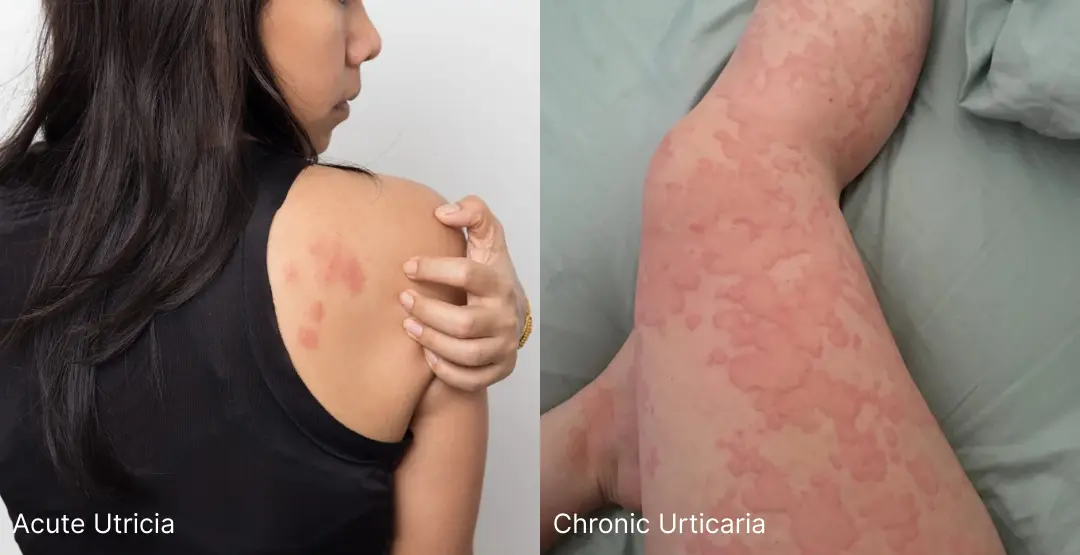
Hives – Causes, Symptoms, and Treatment
Causes of Hives
Hives occur when the body releases histamine and other chemicals in response to a trigger, causing fluid to leak from tiny blood vessels in the skin. Triggers can vary widely from person to person, and in some cases, no specific cause is found (idiopathic hives).
Common causes include
- Allergic reactions to certain foods (such as shellfish, nuts, eggs, and dairy), medications, insect stings, or latex are among the most common triggers.
- Infections, such as colds, flu, or urinary tract infections
- Physical factors, like heat, cold, sunlight, pressure on the skin, or exercise
- Stress or emotional triggers
- Chronic medical conditions, including autoimmune disorders and thyroid disease
Symptoms of Hives
Hives can develop anywhere on the body and may appear suddenly, lasting from minutes to hours. In chronic cases, symptoms may recur for weeks or months. These symptoms can be mild or distressing, and often appear without warning.
Key symptoms include
- Raised, red, or skin-coloured welts that may merge into larger patches
- Intense itching, which may worsen at night
- Swelling (angioedema) of the lips, eyelids, tongue, or throat in more severe cases
- Blanching – the centre of a hive turns white when pressed
- Hives that change shape, size, or location within hours
Seek emergency care immediately if hives are accompanied by swelling of the throat, difficulty breathing, or dizziness, it may indicate a serious allergic reaction (anaphylaxis) and requires immediate emergency care.
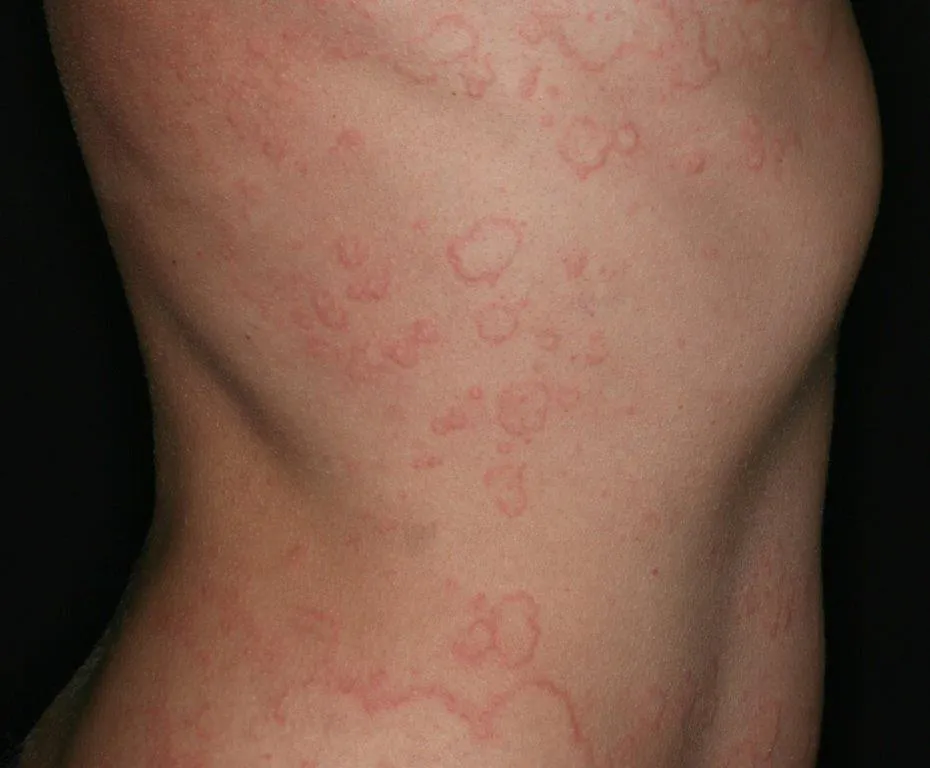
How We Diagnose Hives
Our GMC-certified dermatologists begin with a thorough skin examination and a detailed discussion of your medical history, including recent food intake, medications, stress levels, and possible allergen exposure.
In many cases, hives can be diagnosed by their appearance alone. However, for persistent, chronic, or unexplained cases, we may recommend additional tests such as:
- Allergy testing to identify immune triggers
- Blood tests to rule out infections or autoimmune conditions
- Skin biopsy in rare cases to confirm the diagnosis
Our 4-Step Hives Care Process for You
- Consultation
Your dermatologist will assess your skin, confirm the diagnosis, and listen carefully to your symptoms and concerns. - Diagnosis & Planning
We work with you to identify likely triggers and design a personalised treatment plan, which may include medication and avoidance strategies. - Treatment Initiation
You’ll receive the most appropriate treatment for your needs, along with clear, easy-to-follow instructions. - Ongoing Management & Support
We’ll monitor your progress through follow-up appointments and adjust your plan to ensure long-term control and symptom prevention.
Hives Treatment & Management
Effective hives care focuses on relieving itching and swelling, preventing flare-ups, and addressing underlying triggers. Your plan will be tailored to your type of hives, severity, and lifestyle.
Treatment Options We Provide
Non-drowsy Antihistamines: Used daily or as needed to reduce itching, redness, and swelling.
Corticosteroids: Short courses of oral steroids for severe flare-ups that don’t respond to antihistamines.
Trigger Avoidance Strategies: We help you pinpoint foods, medications, or environmental factors (such as heat, cold, or pressure) that worsen symptoms, and provide a clear plan to minimise exposure.
Advanced Therapy for Chronic Hives
- Omalizumab (Xolair) A biologic injection for chronic hives unresponsive to standard treatments.
- Leukotriene Receptor Antagonists Used alongside antihistamines for additional relief in select cases.
Benefits of Professional Hives Treatment
✔️ Accurate diagnosis of triggers
✔️ Fast relief from itching and swelling
✔️ Lower risk of recurrence
✔️ Tailored long-term management
Why Chose Revitalise London?
We prioritise clinical excellence and patient experience. Here’s why hundreds choose us:
Nathalie Emmanuel
Actress - Game of Thrones Star
Had a wonderful experience with Dr Ken and his staff with my forehead lipoma removal. Thorough in planning before the procedure and so far, l've had a great experience with aftercare. When I had any questions there was always someone available to answer them.

Our Medical Team
Meet the experienced professionals who will provide your care
Our Accreditations
Trusted by healthcare regulators and professional bodies for maintaining the highest standards of medical care and patient safety.
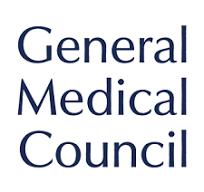

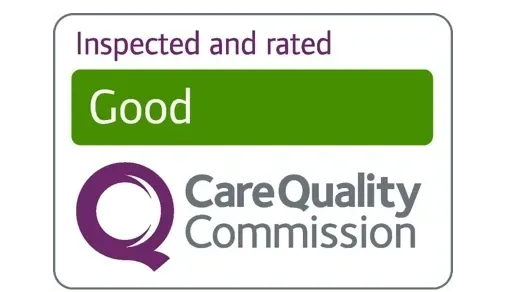
🛡️ Regulated & Certified Healthcare
All treatments are performed by GMC registered doctors in our CQC regulated clinic, ensuring the highest standards of safety and care.
Frequently Asked Questions about Hives
Hives are caused by a release of histamine in response to a trigger. Common triggers include food allergies, medications, insect stings, infections, stress, or physical factors like heat, cold, or pressure on the skin.
No, hives are not contagious. They are an internal reaction caused by the release of chemicals in your skin. You cannot catch hives from another person or spread them to someone else.
The duration depends on the type. Acute hives typically appear and fade within a few hours to a few days and resolve within six weeks. Chronic hives persist or recur for more than six weeks and can last for months or even years.
You should book a consultation if your hives last for more than a few days, keep coming back frequently, are severe, or are accompanied by other symptoms like swelling of the face, lips, or throat, or difficulty breathing.
The key feature of hives is that the individual welts often appear and disappear within hours and can change shape or location. Most other rashes, like eczema or contact dermatitis, typically stay in one fixed location.
Yes, stress is a recognised trigger for some people. Both emotional and physical stress can cause a flare-up of hives.
While there is no definitive "cure" for chronic hives, they can be very effectively managed. A dermatologist can help you identify triggers and use a combination of medications, including advanced biologics, to achieve long periods of remission and significantly improve your quality of life.
Treatment is tailored to the severity and type of hives. Your dermatologist may recommend antihistamines to reduce itching and swelling, or a short course of corticosteroids for more severe, acute flare-ups. In chronic cases that don’t respond to standard therapies, advanced options such as biologic injections may be advised. Identifying and avoiding personal triggers is also a key part of long-term hives management.





